Related Research Articles

The Dorians were one of the four major ethnic groups into which the Hellenes of Classical Greece divided themselves. They are almost always referred to as just "the Dorians", as they are called in the earliest literary mention of them in the Odyssey, where they already can be found inhabiting the island of Crete.

The Second Peloponnesian War, often called simply the Peloponnesian War, was an ancient Greek war fought between Athens and Sparta and their respective allies for the hegemony of the Greek world. The war remained undecided until the later intervention of the Persian Empire in support of Sparta. Led by Lysander, the Spartan fleet finally defeated Athens which began a period of Spartan hegemony over Greece.
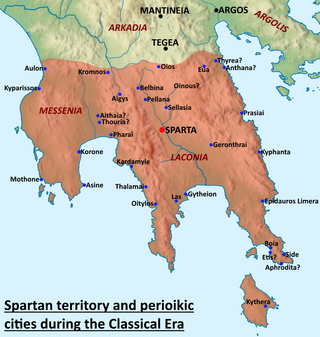
Sparta was a prominent city-state in Laconia in ancient Greece. In antiquity, the city-state was known as Lacedaemon, while the name Sparta referred to its main settlement on the banks of the Eurotas River in the Eurotas valley of Laconia, in south-eastern Peloponnese. Around 650 BC, it rose to become the dominant military land-power in ancient Greece.

Epaminondas was a Greek general and statesman of the 4th century BC who transformed the Ancient Greek city-state of Thebes, leading it out of Spartan subjugation into a pre-eminent position in Greek politics called the Theban Hegemony. In the process, he broke Spartan military power with his victory at Leuctra and liberated the Messenian helots, a group of Peloponnesian Greeks who had been enslaved under Spartan rule for some 230 years following their defeat in the Third Messenian War ending in 600 BC. Epaminondas reshaped the political map of Greece, fragmented old alliances, created new ones, and supervised the construction of entire cities. He was also militarily influential and invented and implemented several important battlefield tactics.
Eurysthenes was king of Sparta and one of the Heracleidae in Greek mythology. He was a son of Aristodemus and Argia, daughter of Autesion. He had a twin brother, Procles. Together they received the land of Lacedaemon after Cresphontes, Temenus and Aristodemus defeated Tisamenus, the last Achaean king of the Peloponnesus. Eurysthenes married Lathria, daughter of Thersander, King of Kleonae, sister of his sister-in-law Anaxandra, and was the father of his successor, Agis I, founder of the Agiad dynasty of the Kings of Sparta.
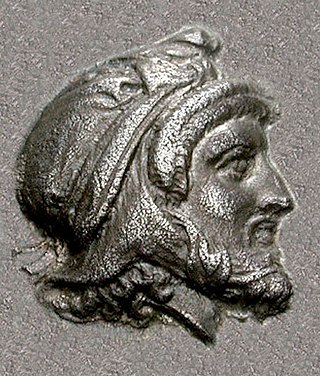
Pharnabazus II was a Persian soldier and statesman, and Satrap of Hellespontine Phrygia. He was the son of Pharnaces II of Phrygia and grandson of Pharnabazus I, and great-grandson of Artabazus I. He and his male ancestors, forming the Pharnacid dynasty, had governed the satrapy of Hellespontine Phrygia from its headquarters at Dascylium since 478 BC. He married Apama, daughter of Artaxerxes II of Persia, and their son Artabazus also became a satrap of Phrygia. According to some accounts, his granddaughter Barsine may have become Alexander the Great's concubine.
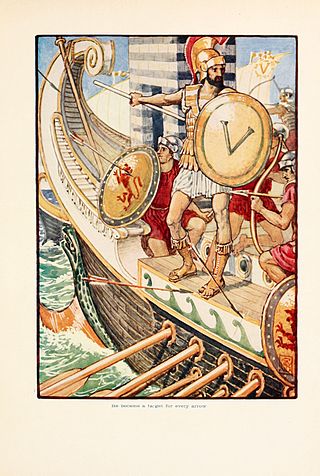
Brasidas was the most distinguished Spartan officer during the first decade of the Peloponnesian War. He died during the Second Battle of Amphipolis while winning one of his most spectacular victories.
The helots were a subjugated population that constituted a majority of the population of Laconia and Messenia – the territories ruled by Sparta. There has been controversy since antiquity as to their exact characteristics, such as whether they constituted an Ancient Greek tribe, a social class, or both. For example, Critias described helots as "slaves to the utmost", whereas according to Pollux, they occupied a status "between free men and slaves". Tied to the land, they primarily worked in agriculture as a majority and economically supported the Spartan citizens.
The ephors were a board of five magistrates in ancient Sparta. They had an extensive range of judicial, religious, legislative, and military powers, and could shape Sparta's home and foreign affairs.
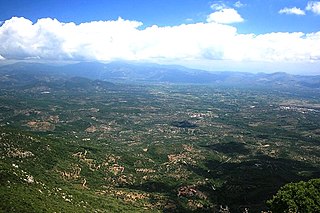
The Crypteia, also referred to as Krypteia or Krupteia, was an ancient Spartan state institution. The kryptai either principally sought out and killed helots across Laconia and Messenia as part of a policy of terrorising and intimidating the enslaved population, or they principally did a form of military training, or they principally endured hardships as an initiation ordeal, or the Crypteia served a combination of all these purposes, possibly varying over time. The Krypteia was an element of the Spartan state's child-rearing system for upper-class males.
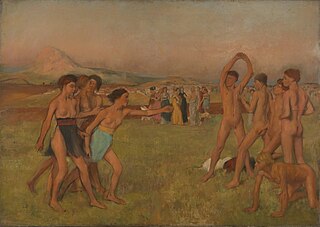
The agoge was the training program pre-requisite for Spartiate (citizen) status. Spartiate-class boys entered it age seven, and aged out at 30. It was considered violent by the standards of the day, and was sometimes fatal.

Laconophilia is love or admiration of Sparta and of the Spartan culture or constitution. The term derives from Laconia, the part of the Peloponnesus where the Spartans lived.
Lycurgus was the legendary lawgiver of Sparta, credited with the formation of its eunomia, involving political, economic, and social reforms to produce a military-oriented Spartan society in accordance with the Delphic oracle. The Spartans in the historical period honoured him as god.

Synoecism or synecism, also spelled synoikism, was originally the amalgamation of villages in Ancient Greece into poleis, or city-states. Etymologically, the word means "dwelling together (syn) in the same house (oikos)." Subsequently, any act of civic union between polities of any size was described by the word synoikismos, in addition to the Latinized synoecism. Synoecism is opposed to Greek dioecism, the creation of independent communities within the territory of a polis.
A Spartiate or Homoios was an elite full-citizen male of the ancient Greek city-state of Sparta. Spartiate-class males were a small minority: estimates are that they made up between 1/10 and 1/32 of the population, with the proportion decreasing over time; the vast majority of the people of Sparta were helots (slaves).

Phlius or Phleius (Φλειοῦς) was an independent polis (city-state) in the northeastern part of Peloponnesus. Phlius' territory, called Phliasia (Φλιασία), was bounded on the north by Sicyonia, on the west by Arcadia, on the east by Cleonae, and on the south by Argolis. This territory is a small valley about 900 feet (270 m) above the level of the sea, surrounded by mountains, from which streams flow down on every side, joining the river Asopus in the middle of the plain. The mountain in the southern part of the plain, from which the principal source of the Asopus springs, was called Carneates (Καρνεάτης). The territory of Phlius was celebrated in antiquity for its wine. According to Strabo, the ancient capital of the country was Araethyrea (Ἀραιθυρέα) on Mt. Celosse, which city is mentioned by Homer; but the inhabitants subsequently deserted it and built Phlius at the distance of 30 stadia. Pausanias, however, does not speak of any migration, but says that the ancient capital was named Arantia (Ἀραντία), from its founder Aras, an autochthon, that it was afterwards called Araethyrea from a daughter of Aras, and that it finally received the name of Phlius, from Phlias, a son of Ceisus and grandson of Temenus. The name of Arantia was retained in the time of Pausanias in the hill Arantinus, on which the city stood. Hence the statement of grammarians that both Arantia and Araethyrea were ancient names of Phlius. According to Stephanus of Byzantium, Phlius derived its name from Dionysus and Chthonophyle. Phlius was subsequently conquered by Dorians under Rhegnidas, who came from Sicyon. Some of the inhabitants migrated to Samos, others to Clazomenae; among the settlers at Samos was Hippasus, from whom Pythagoras derived his descent.

The Spartan army was the principle ground force of Sparta. It stood at the center of the Spartan state, consisting of citizens trained in the disciplines and honor of a warrior society. Subjected to military drills since early manhood, the Spartans became one of the most feared and formidable military forces in the Greek world, attaining legendary status in their wars against Persia. At the height of Sparta's power – between the 6th and 4th centuries BC – other Greeks commonly accepted that "one Spartan was worth several men of any other state."
The Spartan Constitution are the government and laws of the classical Greek city-state of Sparta. All classical Greek city-states had a politeia; the politeia of Sparta however, was noted by many classical authors for its unique features, which supported a rigidly layered social system and a strong hoplite army.
The Lacedaemonion Politeia, known in English as the Polity, Constitution, or Republic of the Lacedaemonians, or the Spartan Constitution, is a treatise attributed to the ancient Greek historian Xenophon, describing the institutions, customs, and practices of the ancient Spartans. The work examines the reasons for Sparta's power and renown, despite the city state's sparse population. There are fifteen chapters: the first thirteen enumerate the practices and institutions that made Sparta great; the last two describe Sparta's decline and the survival of its monarchy. The Polity dates to the period between 387 and 375 BC, and is the only contemporary account of the Spartan political system which survives. Together with Plutarch's "Life of Lycurgus", it provides the most detailed surviving description of the Spartan state, and is considered the best source of information about Spartan women during classical antiquity.
Sciritis or Skiritis was a rugged and barren mountainous district in the north of ancient Laconia, between the upper Eurotas on the west and the Oenus on the east, and extending north of the highest ridge of the mountains, which were the natural boundary between Laconia and Arcadia. The name probably expressed the wild and rugged nature of the country, for the word signified hard and rugged. It was bounded by Maenalia on the north, and by Parrhasia on the west, and was originally part of Arcadia, but was conquered at an early period, and its inhabitants reduced to the condition of Lacedaemonian Perioeci. According to Xenophon they were subjected to Sparta even before the time of Lycurgus.
References
- ↑ Harpers Dictionary of Classical Antiquities. New York: University of Chicago Press. 2003.
- ↑ de Jaucourt, Louis (2014) [1765]. "Xenelasia of Sparta". The Encyclopedia of Diderot & d'Alembert Collaborative Translation Project. Translated by Haydn Mason. Ann Arbor: University of Michigan Publishing.
- ↑ Larcher's notes on Herodotus, historical and critical comments on the History of Herodotus. From the Fr, Volume 1 1844.
- ↑ Legislation against foreign residents.
- ↑ Xenophon. "Constitution of the Lacedaimonians". data.perseus.org. Translated by E.C. Marchant; G.W. Bowersock. chapter 14, section 4. Retrieved 2018-03-07.
- ↑ Thucydides (1910). The Peloponnesian War. Vol. 2. Translated by Richard Crawley. London; New York: J. M. Dent; E. P. Dutton. chapter 39, section 1. Retrieved 2018-03-07.
- ↑ Plutarch: The Lives of the Noble Grecians and Romans, trans. by John Dryden and revised by Arthur Hugh Clough, The Modern Library (div of Random House, Inc). Bio on Lycurgus, pg 70.
- ↑ The Prince, Niccolò Machiavelli, trans. & ed. by Robert M. Adams, W.W. Norton & Co., NY, 1992. pg 96 Machiavelli Balanced Government
- ↑ The Collected Dialogues of Plato, edited by Edith Hamilton and Huntington Cairns, Bollingen Series LXXI, Princeton University Press, Princeton, NJ, 1961. The Laws, §680c; pg 1275.
- ↑ The History and Antiquities of the Doric Race, Karl Otfried Müller, 2nd ed. rev. 1839. Vol II, pg 157.
- ↑ The History and Antiquities of the Doric Race, Karl Otfried Müller, 2nd ed. rev. 1839. Vol II, pg 149.
- ↑ The History and Antiquities of the Doric Race, Karl Otfried Müller, 2nd ed. rev. 1839. Vol II, pg 183
- ↑ The History and Antiquities of the Doric Race, Karl Otfried Müller, trans. from the German by Henry Tufnell and George Cornewall Lewis, John Murray, London, 2nd ed. rev. 1839. Vol II, pg 4